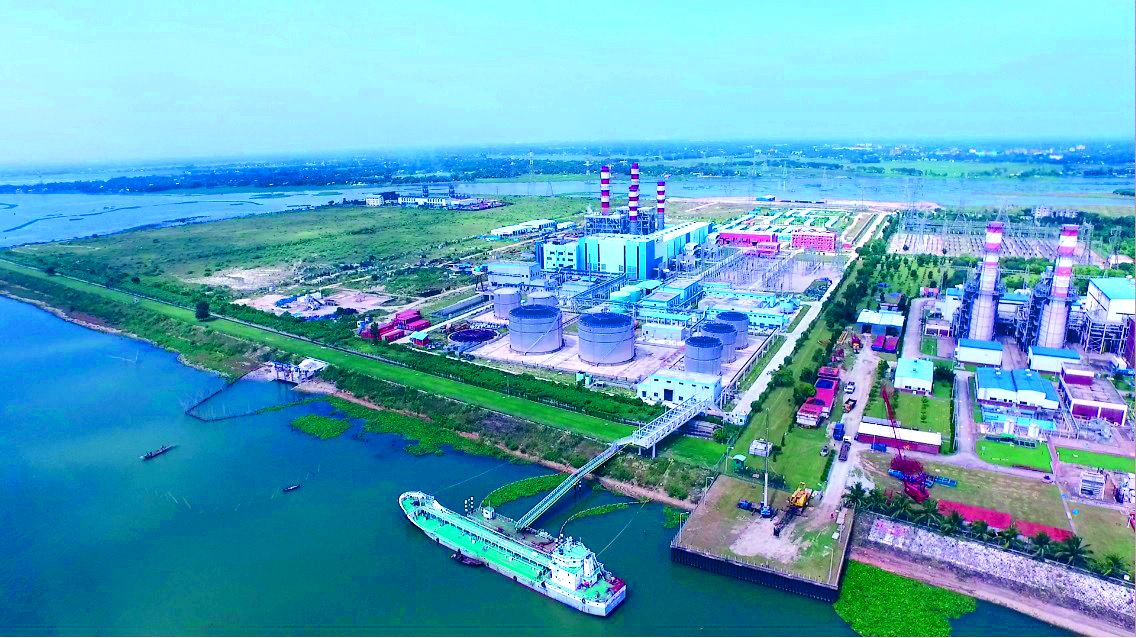She has the face for a Lancôme campaign and brains that can easily secure a seat at any good university, but Ms. Ayesha Aziz Khan thinks her biggest blessing is having parents who understand the importance of education. “They insisted that we finish school first before we go out there and pursue whatever we wanted,” she tells me. And so she completed her degree in economics and business at the University College London, followed it up with an MBA at Columbia University, and joined the family corporation. “In school I did well in mathematics, especially in higher maths,” Ms. Khan says. “I was something of a dork,” she adds with a laugh.

Today, Ms. Khan runs Summit Power International (SPI), the largest independent power producer (IPP) in Bangladesh, and serves as director in several companies at Summit Group, the conglomerate that her family owns. She reports to her father, eminent businessman Mr. Muhammed Aziz Khan, who is founder and chairman of the SPI board. “Each business under the Group is a separate legal entity that is run independently,” Ms. Khan explains. Meanwhile, professional CEOs have been hired to run the other businesses, for which some members of the family also work.
At Summit, Ms. Khan has held various key positions, including director of finance management of Summit Power Limited, a publicly listed company in Bangladesh, and group finance director of Summit Corporation Limited. Through these, she mastered the complex task of financial management and structuring for power generation companies, and has spearheaded the financing of billion-dollar power projects.
- THE BANGLADESHI BEHEMOTH
- RAPIDLY EXPANDING REQUIREMENT
- EXPANDING INTO NEW MARKETS
- NEXT PHASE OF GROWTH
The Bangladeshi Behemoth
Summit Group, the largest infrastructure conglomerate in Bangladesh, has companies in communication, energy and power, shipping, trading, real estate, and port – of which power is the largest. Its company, Summit Power International (SPI), is a leading IPP in South Asia. It owns and operates the infrastructure that generates power, which it then sells to the government. SPI’s portfolio comprises 17 operating power plants with a combined (electricity generation) capacity of 1,644 megawatts, roughly 14 per cent of actual demand. It has plans to increase its capacity by adding further 3,500 megawatts with projects that are in the pipeline.
Since establishing the first independent power plant in Bangladesh in 1997, SPI has grown into the largest IPP in Bangladesh, representing 21 per cent of the country’s total private installed capacity, and nine per cent of Bangladesh's total installed capacity as of 2017.
“SPI identifies portfolio-enhancing opportunities, both greenfield sites and existing power assets, that offer significant value to the power needs of the country, and to our stakeholders,” Ms. Khan explains. The company establishes long-term, contractually backed concession power purchase agreements with governments, for which it realizes stable, risk-mitigated revenue streams based on contracted capacity payments.
SPI maintains strong environmental commitments in the delivery of its services. “As a company, we are still examining the overall cost benefit of a coal-based power plant—a very difficult decision for us,” Ms. Khan says. The company is interested in a technology that will have minimum environmental impact, she reasons. “The technologies that we are using have much less negative effect on the environment and, therefore, the economy. It’s our conscious decision to continuously ensure that our power generation is sustainable. And that the value addition is not just in terms of the power we generate, but in overall sustainability and improvement of the society where we are operating the power plants.”

- THE BANGLADESHI BEHEMOTH
- RAPIDLY EXPANDING REQUIREMENT
- EXPANDING INTO NEW MARKETS
- NEXT PHASE OF GROWTH
Rapidly Expanding Requirement
“Of the five of us in this room, at least one is wearing a piece of clothing that was made in Bangladesh,” Ms. Khan, by way of explaining the country’s importance as an apparel manufacturer, says with certainty. “It is the second largest exporter of ready-made clothing in the world. We’re not talking here of where Italy has gone, or even Turkey, which is making garments with high value – designer products that go through demand and supply fluctuations depending on how well the global economy is doing.”
Industry, which includes manufacturing, is the second major contributor to the Bangladeshi economy, after agriculture, and employs 20.4 per cent of the 109.1 million estimated labor force. A sustained growth in GDP, currently at 7.2 per cent, and a large population (160 million in 2016) fuels the demand for electric power.
The Bangladeshi government is implementing a range of policies and projects to meet this rapidly growing demand, with a view that energy is vital in securing economic growth, sustainable infrastructure development, and poverty eradication. In other words, sustained economic growth is only possible with stable and affordable power supply.
As in most countries, the power industry in Bangladesh is regulated by the government, Ms. Khan points out. “We can see that the government is doing a good job. The demand is extraordinary, and although there is enough investment to prevent bottlenecks in the value chain, more investment is needed to handle projected electricity requirements. High investments in electricity generation and energy supply are needed, especially for the importation of oil and liquefied natural gas (LNG).”
- THE BANGLADESHI BEHEMOTH
- RAPIDLY EXPANDING REQUIREMENT
- EXPANDING INTO NEW MARKETS
- NEXT PHASE OF GROWTH
Expanding into New Markets
Foremost in Ms. Khan’s mind is keeping SPI’s position as the largest IPP in Bangladesh, as it looks into expanding into the region. Sri Lanka, which bears strong similarities to the market conditions in Bangladesh, is among those that the company is studying for expansion.
“Before we go into any market, we ensure that we understand it very well. Summit Group has been a conservative company, and has grown in a very systematic manner. It is only when we understand the market that we increase our investments, but the first round is typically very discreet, and we would like to maintain that.”
In Southeast Asia, Ms. Khan is closely studying Myanmar and Indonesia. The former has a good population base and a steadily growing economy. “We prefer to enter markets that are smaller, younger, and in a similar situation as Bangladesh, where we can replicate what we know and commence operation efficiently and effectively.
“What is necessary for us to enter a market is knowing where we can add value. We think we create the most amount of value when the market requires electricity.” That rules out competing in a very matured market with long-running incumbents dominating the industry. “That’s not the business we know well; rather, we are able to build the infrastructure that is sustainable and reasonably priced, and meets the demands of the people.”

- THE BANGLADESHI BEHEMOTH
- RAPIDLY EXPANDING REQUIREMENT
- EXPANDING INTO NEW MARKETS
- NEXT PHASE OF GROWTH
Next Phase of Growth
SPI has recently made public its intention to list on the Singapore Exchange (SGX). The company plans to shore up capital for investment in the next five years – expected to be in billions of dollars – for further infrastructure development, and expansion into new markets. (The company has declined to reveal the valuation of the IPO.)
SPI is the only company of Summit Group to seek international public listing, Ms. Khan points out. “We still fully own the (other) businesses that together make up about 30 to 40 per cent of our size, depending on which numbers you’re looking at. Power, being the largest company, represents about 60 per cent.
“Power is a highly capital-intensive business so we’re trying to raise a lot of money. Over the next 10 years, we will need anywhere from 300 to 500 million dollars of equity. The most effective manner of raising equity is still the capital market.”
Ms. Khan surmises that the biggest risk in Bangladesh’s power industry at the moment is lack of ample investment. Bottlenecks – in supply, transmission or distribution – can arise from lack of investments, and over a prolonged period may develop into a risk. The total value chain – of energy supply, power generation, transmission, and distribution – is complex, Ms. Khan says. For example, shipping routes for transporting raw materials and warehousing facility to store them will have to be built. “Power generation, by itself, is systematically a simple business. Once you’ve set up a power plant, very few things that can go wrong.
“What we’re doing is putting investments into power generation, but we’re also making sure that energy supply is well managed. And we’re keeping our eyes wide open to ensure that transmission and distribution do not go through any kind of bottleneck.”














 Back
Back
